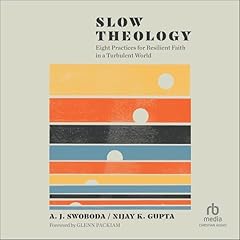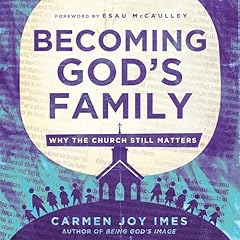
Neither Complementarian nor Egalitarian
A Kingdom Corrective to the Evangelical Gender Debate
No se pudo agregar al carrito
Add to Cart failed.
Error al Agregar a Lista de Deseos.
Error al eliminar de la lista de deseos.
Error al añadir a tu biblioteca
Error al seguir el podcast
Error al dejar de seguir el podcast
 Exclusivo para miembros Prime: ¿Nuevo en Audible? Obtén 2 audiolibros gratis con tu prueba.
Exclusivo para miembros Prime: ¿Nuevo en Audible? Obtén 2 audiolibros gratis con tu prueba.Compra ahora por $18.91
-
Narrado por:
-
Sarah Zimmerman
Christianity Today Book Award Winner
Regarding gender relations, the evangelical world is divided between complementarians and egalitarians. While both perspectives have much to contribute, the discussion has reached a stalemate. Michelle Lee-Barnewall critiques both sides of the debate, challenging the standard premises and arguments and offering new insight into a perennially divisive issue in the church. She brings fresh biblical exegesis to bear on our cultural situation, presenting an alternative way to move the discussion forward based on a corporate perspective and on kingdom values.
The book includes a foreword by Craig L. Blomberg and an afterword by Lynn H. Cohick.
©2016 Michelle Lee-Barnewall (P)2022 TantorLos oyentes también disfrutaron:




















Las personas que vieron esto también vieron:


















Scripture, history, thought processes and logic
Se ha producido un error. Vuelve a intentarlo dentro de unos minutos.
It is important for a reviewer to be honest about her or his own perspective, so I must admit that, although I do not claim membership in either camp, I learned from Lee-Barnwall that I am not as dissatisfied with the egalitarian position as some non-complementarians are. Moreover, I write this review with a significant amount of hindsight; I write the review nine years after the book was originally published.
The strongest aspects of the book are its Foreword and Afterword, written by Mark Blomberg and Lynn Cohick respectively. Blomberg’s contribution is warm and humble; Cohick’s is detailed and precise. Both bring significant expertise and insight to their contributions.
As for Lee-Barnwall’s work, its most important contribution to the debate is the insistence that the entire debate be reframed in terms of priorities determined by the Kingdom of God. These priorities begin with love and unity, but they also include shifting our focus away from the individual (whether leader or the one led) and to the church as a whole and especially to God. This shift in priorities does not merely soften expressions of authority or declarations of rights. It fundamentally reconstructs the Christian community around an ethic of self-sacrifice.
Nevertheless, there are significant holes in Lee-Barnwall’s work, and these holes sometimes inhibit her ability to properly interpret biblical or historical themes. The most glaring of these weaknesses is a lack of engagement with the psychology of gender. Indeed, I would argue there is no substantial articulation of what it means to be male or female in the Bible, and this is as it ought to be since gender expression tends to fall on a continuum rather than express itself in a rigid set of physical, psychological, and social characteristics.
Moreover, Lee-Barnwall over-emphasizes certain aspects of the biblical evidence. For example, I am convinced that she overstates the presence of hierarchy in New Testament texts. More importantly, she overstates her case for a reading of the Bible that emphasizes collectivist rather than individualistic concerns. As Everett Ferguson has observed, the Greco-Roman context was slowly drifting in a more individualistic direction, and this drift doubtless modified, subverted, or even overturned previously held collectivist assumptions. Indeed, as one who studied under one of the architects of today’s social-scientific reading of the Bible, I am struck by how much concern is shown for how individual convictions and conduct are vital to the well-being of the whole.
To that end, it is also worth pointing out that the egalitarian position may not be a quest for individual rights so much as it is an insistence upon the impartiality of ecclesiastical systems, structures, and leaders in how they interact with classes of individuals. Lee-Barnwall’s connection of the Christian feminism of the 1970s with the Civil Rights Movement of the 1960s is enlightening, but I am not convinced that she adequately credited that connection for raising important issues related to the church’s treatment of those who had been previously disempowered. Indeed, Lee-Barnwall leaves almost entirely unaddressed what I think is the fundamental question of the modern debate: Can equality of status exist without equality of power? She might respond that this is the wrong question, given the emphases that she finds in the biblical record, but she cannot evade the question this easily. That is because even her own presentation begs a vital question: How can believers engage in the disciplines urged by her (proper) exegesis of kingdom values when they do not possess the structural or social power that makes “submission” meaningful?
Further, I question whether Lee-Barnwall has really come to her presentations of the issues at stake with an even hand. For example, she does much to explicate the social and historical contingency of the egalitarian position, but similar critiques of complementarianism are almost entirely lacking. Part of this deficiency may result from her admirable habit of presenting the best aspects of each of the warring perspectives. Nevertheless, the reader is left with an incomplete—and, frankly, insufficiently prophetic—critique of complementarian arguments for male superiority.
Finally, Lee-Barnwall may overread the significance of Genesis 2:23-24 in terms of insisting that men have a special responsibility for building and preserving the “one flesh” union of marriage, and she certainly underreads the significance of Galatians 3:26-29 in terms of its insistence on the functional equality of male and female in the body of Christ. If I am right about her reading of these texts, then the usefulness of her work as a guide for future reflection is greatly reduced.
Though many of the comments I have presented above are critical, the church owes Lee-Barnwall a huge debt of gratitude for the time, work, and care she put into this study. Moreover, we owe her an enormous debt of gratitude for taking on the risk of challenging both complementarians and egalitarians to reconsider their positions, put down their arms, and work together for a better future. The reader should engage Lee-Barnwall with care, but the reader should engage her work. Read this book, and prayerfully come to your own conclusions about its accuracy and value. For my part, I am proud to call her my sister in Christ, and I am delighted to affirm her authority as a teacher (and maybe even a prophet) on Christ’s behalf.
Worthy of Honor
Se ha producido un error. Vuelve a intentarlo dentro de unos minutos.
Important new framework
Se ha producido un error. Vuelve a intentarlo dentro de unos minutos.


